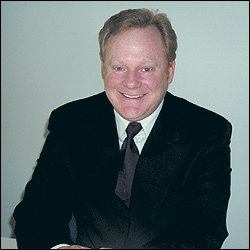Untitled Document
 |
Andy Stephenson in March 2004.
(Karen Steichen) |
Voting-rights activist Andy Stephenson was so full of life it seems impossible
that he is dead. Surrounded by his life partner, Ted Edmondson, and members of
his family, Stephenson passed away on Thursday, July 7, at Seattle's Virginia
Mason Medical Center. The Seattle resident was 43.
Walter Andrew Stephenson was born in El Paso, Texas. He worked as a telemarketer
and was a Subway shop owner before he became concerned about issues surrounding
electronic voting and ballot security in 2004. He quickly decided to run as
a Democratic candidate for Washington secretary of state opposing Republican
incumbent Sam Reed, on a platform calling for a voter-verified paper ballot.
But Stephenson dropped out of the race to work full time with prominent election-integrity
advocate Bev Harris of Renton, who leads Black Box Voting (www.blackboxvoting.org).
The two activists later parted on bad terms, but Stephenson's work with Black
Box Voting raised his national profile, and after he left the organization he
continued grassroots lobbying with a loosely affiliated network of like-minded
people over the Internet.
In person, Stephenson was a red-headed, crackerjack live wire, full of ideas
and energy, chasing after every hint of impropriety by election administrators
and the corporations that make voting software and hardware. During an interview,
he would simultaneously smoke cigarettes, drink coffee, take phone calls, assign
tasks to volunteers, condemn elected officials, and rail against Election Systems
& Software, Diebold, and other voting-equipment corporations. He was a heartfelt
advocate for his cause and didn't shy from confrontation with government officials
and corporate officers. His passion and affability attracted a following here
and on the World Wide Web, particularly among the frequenters of the progressive
Web site Democratic Underground (www.democraticunderground.com).
Stephenson became ill in January, and months of treatment followed. In April,
he was diagnosed with pancreatic cancer. Like the fighter he was, Stephenson
was determined to beat the disease and decided to have surgery at Johns Hopkins
Hospital in Baltimore. But he was out of work and without insurance, and Hopkins
requires payment in full for out-of-state, uninsured patients. So Stephenson's
online community raised $50,000 for him over the Internet. San Francisco's Elisabeth
Ferrari led the effort, raising the money in just 12 days. It was a tribute
to his political work and another demonstration of the power of the Internet.
But it also spawned a bizarre Web campaign that accused Stephenson of faking
his illness to scam money (see "Cancerous Campaign," July 6). In response,
a page (homepage.mac.com/benburch/Andy) was created to document his treatment.
Reaction to Stephenson's death by his Internet friends was swift. Wrote Will
Pitt, in a post on Democratic Underground directed at Stephenson's accusers:
"I am going to make you famous in all the worst kinds of ways. I know your
names, I know your addresses, I know your IP numbers, I have screen shots and
copies of every vile statement and threat you ever made. I know everything I
need to know. Get ready for the ram."
Stephenson's health took a turn for the worse on Wednesday June 22, when he
was admitted to Virginia Mason Medical Center with post-surgery complications.
When I visited him the next day, he was still in battle mode—against his
cancer and on behalf of voter rights. Over the next two weeks, his condition
steadily declined. After a series of strokes, he died.
Stephenson is survived by Edmondson; his mother, Dorothy M. Stephenson; two
sisters, Charlene Johns and George Ann Pye; and an extended family in Texas.
He is also grieved for by friends and comrades on the Internet. Wrote Ferrari:
"I'm crying like a damned fountain, but he's free now."
A memorial service will be held at Town Hall in Seattle at 1119 Eighth Ave.,
on Saturday, July 16, at 2 p.m.

